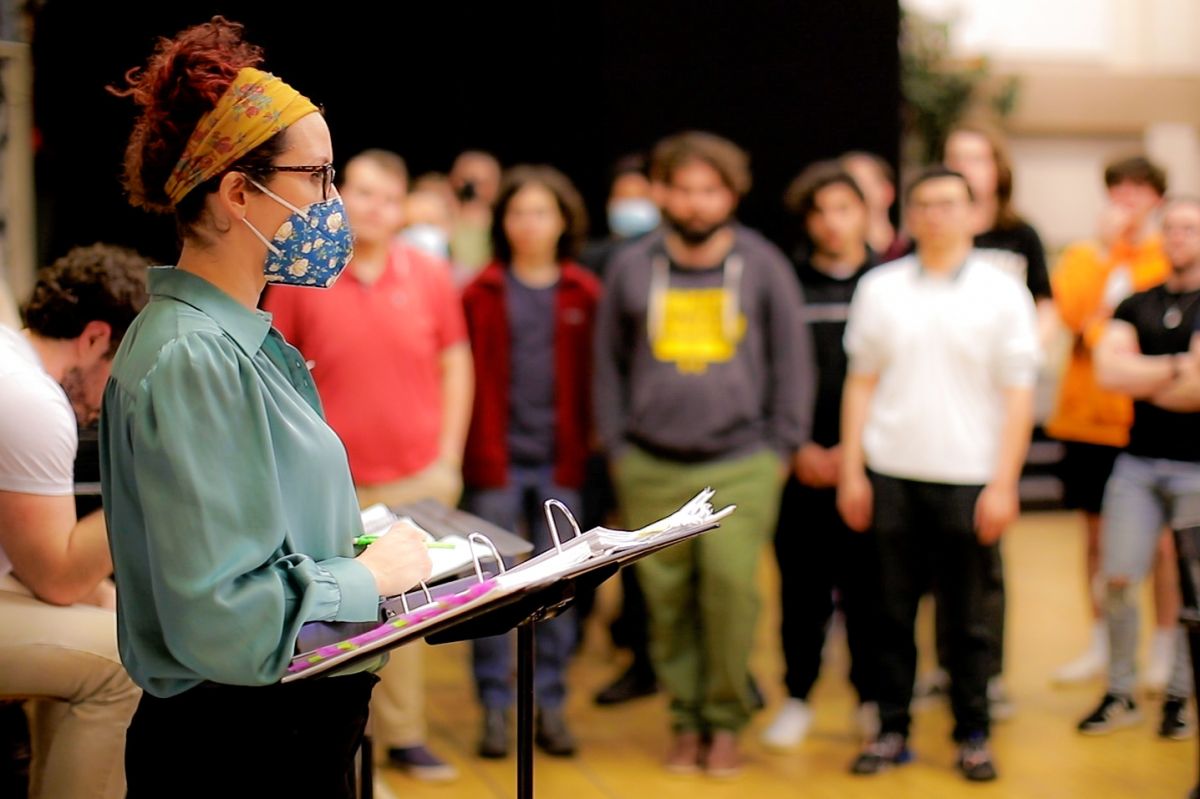Aaron Cain: I'm Aaron Cain for WIFU Arts, the Jacobs School of Music Opera Theatre is presenting a world premiere. An opera based on The Diary of a Young Girl by Anne Frank. Recently I had the chance to speak with the opera’s director, Crystal Manich, about bringing Anne Frank's story to the stage as an opera.
Aaron Cain: What is it like to direct an opera based on a true story?
Crystal Manich: Really challenging. Because you want to do the real person justice. My priority has been to, you know, accurately portray what happened with Anne Frank and her family in that annex, but, at the same time, understanding that this is a theatrical representation, an interpretation of that time—both on the part of the composer, and the librettist, and on my part—and I think to not lose sight of that is really important. Because we can get bogged down in reality, and opera is just not realistic in a lot of ways. Of course, music is a fantastic way of expressing human emotion, but I really feel strongly that the artistic part of it, and how we have the story unfold visually as well as aurally, is really paramount in order to create a successful show that…eventually I want people to be moved by it. And, obviously, if people come who are not, maybe, familiar with Anne Frank—'cause I think nowadays that's very possible. It's been almost 80 years since 1944 when they left the annex—so I think it's very possible that there are young people, especially, who are being introduced to her for the first time. And that, to me, is very important; to open up that interest, that maybe people will have in her, and in a newfound appreciation of her words. Because the diary, some of which is excerpted and put into the opera, is very poignant. And I think they're words that we need to hear now. Things are a little scarier when you don't see everything, and for us, you know, we have very little representation of Nazis in this. There's none. You don't really see them at all. It's really the atmosphere of the music that takes us to the traumatic situation that the camp prisoners find themselves in. And the camp is sort of the macrocosm of what's going on in the story, with the people in the annex being the microcosm. So the camp is always present. So I've been playing around with: does Anne ever notice that those prisoners are always present? Does it mean that she's worried that that's where she's going to end up? And then, through the moments of her writing in the diary, we can see Anne's thoughts and feelings expressed to their fullest.
Aaron Cain: Right now there are two quotes floating around in my head, kind of jockeying for position with each other. One comes from you, just now, and the other is a famous quote from Anne Frank's diary itself. The one from you is, “things are scarier when you don't see everything,” and the quote from Anne Frank is, “in spite of everything. I still believe that people are really good at heart.” What is important about an operatic version of this story of Anne Frank in this historical moment, do you think?
Crystal Manich: I think it allows for the words from the diary to really resonate in a new way. I hadn't revisited the diary since I was 12 until I was attached to this project. And, I mean, there would be moments I had to put it down. I was so overwhelmed. Because the maturity of the writing, the insightfulness, the questioning of why humans would do this, why the world was the way it was. And yet, that exact juxtaposition you're talking about, of, “I still believe in the inherent goodness of people,” and we have that line in the show in a very poignant moment that you will see and hear when you come to see it. That for me is the most important thing, is that through the darkness we have to have what I think she is talking about, which is hope. And to not give up. I recently actually met a 100-year-old Holocaust survivor back in the fall. And someone who was at this event asked him, “how did you keep going?” “What did you talk about with your fellow prisoners at the camp?” And he said, “we only talked about tomorrow. We never talked about yesterday.” What are we learning from Anne Frank that we can take with us to get into tomorrow? What are the words that we can heed so that we can forge a better path for ourselves and for those who come after? And that's really—all of this has very much stuck with me while I've been working on this show.
Aaron Cain: Well, Crystal Manich, congratulations in advance, and thank you so much for taking the time to speak with me today.
Crystal Manich: Thank you.
Aaron Cain: Crystal Manich, director of the world premiere of the Opera, Anne Frank, composed by Shulamit Ran. More information at operaballet.indiana.edu. For WFIU Arts, I'm Aaron Cain.







